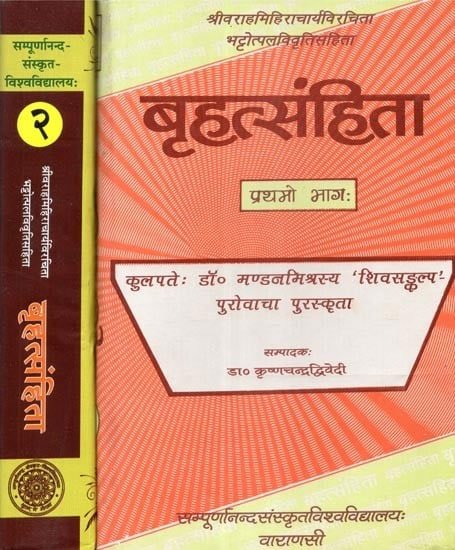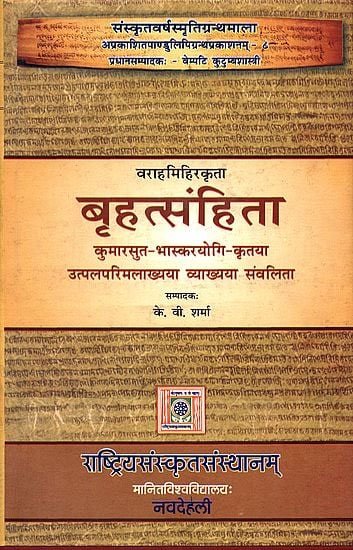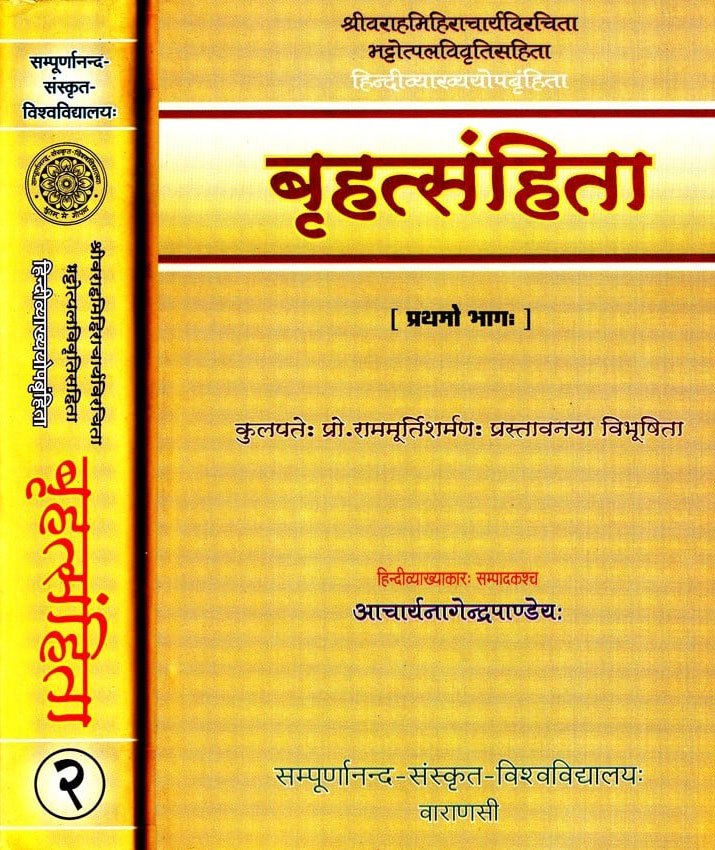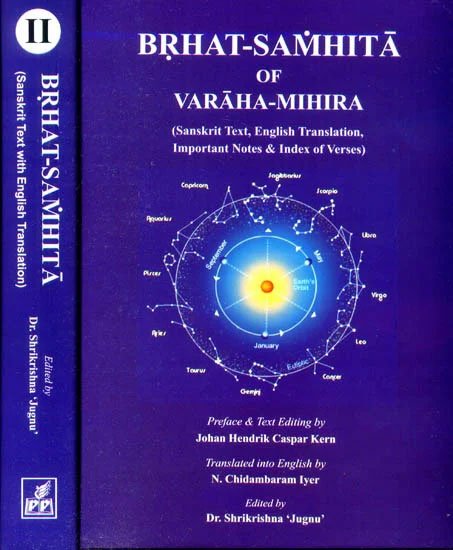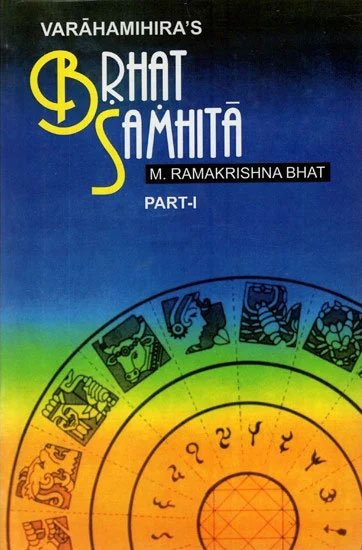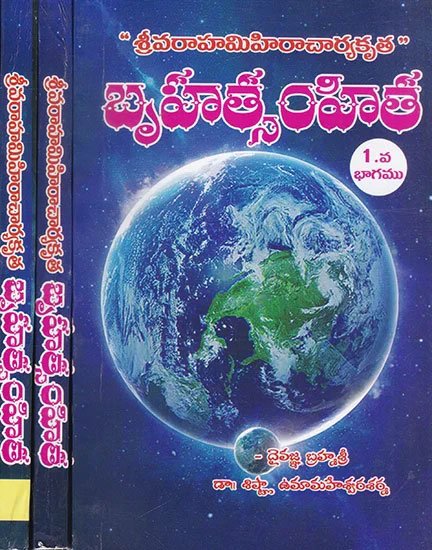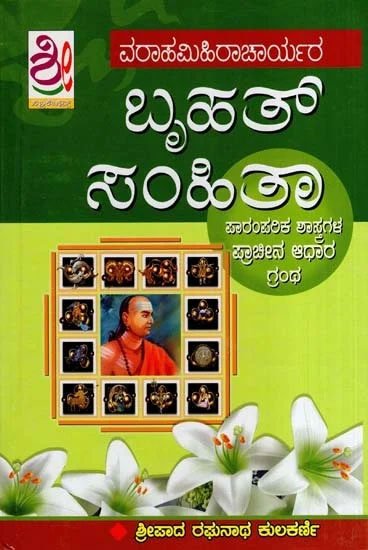Brihat-samhita [sanskrit]
26,560 words
The Sanskrit text of the Brihat-samhita from the 6th-century authored by Varaha Mihira in present-day Ujjain, India. It primarily deals with astrology and astronomy but is presented as an encyclopedia of knowledge.
Verse 95.R(24)
ऊकारमाहुर्वृषभे जले खमस्ते फकारो नृघटे छकारः ।
अन्त्ये वृषे टम् तमुशन्ति सिंहे थं सप्तगे ठं प्रवदन्ति कुम्भे ॥ र्(२४) ॥
ūkāramāhurvṛṣabhe jale khamaste phakāro nṛghaṭe chakāraḥ |
antye vṛṣe ṭam tamuśanti siṃhe thaṃ saptage ṭhaṃ pravadanti kumbhe || R(24) ||
The Sanskrit text of Verse 95.R(24) is contained in the book Brihata Samhita (Sanskrit Text with Hindi Translation) by Pandit Achyutananda Jha. This book is available online or you could buy the latest edition:
Read online Buy now! The Sanskrit text by Pandit Achyutananda Jha (2001)
Glossary of Sanskrit terms
Note: This extracts Sanskrit terms and links to English definitions from the glossary, based on an experimental segmentation of verse (95.R(24)). Some terms could be superfluous while some might not be mentioned. Click on the word to show English definitions.
Ukara, Vrishabha, Jala, Kham, Kha, Asta, Asti, Phakara, Ghata, Ghati, Chakara, Antya, Vrisha, Vrishi, Ushat, Simha, Tha, Sapta, Saptan, Pravat, Anti, Kumbha,
Analysis of Sanskrit grammar
Note: this is an experimental feature and only shows the first possible analysis of the Sanskrit text (Verse 95.R(24)). If the system was successful in segmenting the sentence, you will see of which words it is made up of, generally consisting of Nouns, Pronouns, Verbs, Participles and Indeclinables. Click on the link to show all possible derivations of the word.
- Line 1: “ūkāramāhurvṛṣabhe jale khamaste phakāro nṛghaṭe chakāraḥ ”
- ūkāram -
-
ūkāra (noun, masculine)[adverb], [accusative single]
- āhur -
-
√ah (verb class 5)[perfect active third plural]
- vṛṣabhe -
-
vṛṣabha (noun, masculine)[locative single]vṛṣabha (noun, neuter)[nominative dual], [vocative dual], [accusative dual], [locative single]vṛṣabhā (noun, feminine)[nominative dual], [vocative single], [vocative dual], [accusative dual]
- jale -
-
jala (noun, masculine)[locative single]jala (noun, neuter)[nominative dual], [vocative dual], [accusative dual], [locative single]jalā (noun, feminine)[nominative dual], [vocative single], [vocative dual], [accusative dual]√jal (verb class 1)[present middle first single]
- kham -
-
kham (indeclinable)[indeclinable]kha (noun, masculine)[adverb], [accusative single]kha (noun, neuter)[adverb], [nominative single], [accusative single]khā (noun, feminine)[adverb]
- aste -
-
asta (noun, masculine)[locative single]asta (noun, neuter)[nominative dual], [vocative dual], [accusative dual], [locative single]astā (noun, feminine)[nominative dual], [vocative single], [vocative dual], [accusative dual]asti (noun, feminine)[vocative single]
- phakāro* -
-
phakāra (noun, masculine)[nominative single]
- nṛ -
-
nṛ (noun, masculine)[compound]
- ghaṭe -
-
ghaṭa (noun, masculine)[locative single]ghaṭa (noun, neuter)[nominative dual], [vocative dual], [accusative dual], [locative single]ghaṭā (noun, feminine)[nominative dual], [vocative single], [vocative dual], [accusative dual]ghaṭi (noun, feminine)[vocative single]√ghaṭ (verb class 1)[present middle first single]
- chakāraḥ -
-
chakāra (noun, masculine)[nominative single]
- Line 2: “antye vṛṣe ṭam tamuśanti siṃhe thaṃ saptage ṭhaṃ pravadanti kumbhe || R(24) |”
- antye -
-
antya (noun, masculine)[locative single]antya (noun, neuter)[nominative dual], [vocative dual], [accusative dual], [locative single]antyā (noun, feminine)[nominative dual], [vocative single], [vocative dual], [accusative dual]√ant (verb class 1)[present passive first single]
- vṛṣe -
-
vṛṣa (noun, masculine)[locative single]vṛṣa (noun, neuter)[nominative dual], [vocative dual], [accusative dual], [locative single]vṛṣā (noun, feminine)[nominative dual], [vocative single], [vocative dual], [accusative dual]vṛṣi (noun, masculine)[vocative single]vṛṣi (noun, feminine)[vocative single]
- ṭam -
-
ṭa (noun, masculine)[adverb], [accusative single]ṭa (noun, neuter)[adverb], [nominative single], [accusative single]ṭā (noun, feminine)[adverb]
- tam -
-
ta (noun, masculine)[adverb], [accusative single]ta (noun, neuter)[adverb], [nominative single], [accusative single]tā (noun, feminine)[adverb]tan (noun, masculine)[adverb]sa (noun, masculine)[accusative single]
- uśanti -
-
uśat (noun, neuter)[nominative plural], [vocative plural], [accusative plural]√vaś -> uśat (participle, neuter)[nominative plural from √vaś class 2 verb], [vocative plural from √vaś class 2 verb], [accusative plural from √vaś class 2 verb]√vaś (verb class 2)[present active third plural]
- siṃhe -
-
siṃha (noun, masculine)[locative single]siṃhā (noun, feminine)[nominative dual], [vocative single], [vocative dual], [accusative dual]
- tham -
-
tha (noun, masculine)[adverb], [accusative single]tha (noun, neuter)[adverb], [nominative single], [accusative single]
- sapta -
-
sapta (noun, masculine)[compound], [vocative single]sapta (noun, neuter)[compound], [vocative single]saptan (noun, masculine)[compound]saptan (noun, neuter)[compound], [adverb], [nominative single], [accusative single]√sap -> sapta (participle, masculine)[vocative single from √sap class 1 verb]√sap -> sapta (participle, neuter)[vocative single from √sap class 1 verb]
- ge -
-
ga (noun, masculine)[locative single]ga (noun, neuter)[nominative dual], [vocative dual], [accusative dual], [locative single]gā (noun, feminine)[nominative dual], [vocative single], [vocative dual], [accusative dual]
- ṭham -
-
ṭha (noun, masculine)[adverb], [accusative single]
- pravad -
-
pravat (noun, feminine)[compound], [adverb], [nominative single], [vocative single]pravat (noun, masculine)[compound]pravat (noun, neuter)[nominative single], [vocative single], [accusative single]
- anti -
-
anti (indeclinable adverb)[indeclinable adverb]anti (noun, feminine)[compound], [adverb]antī (noun, feminine)[adverb], [vocative single]
- kumbhe -
-
kumbha (noun, masculine)[locative single]kumbha (noun, neuter)[nominative dual], [vocative dual], [accusative dual], [locative single]kumbhā (noun, feminine)[nominative dual], [vocative single], [vocative dual], [accusative dual]
- Cannot analyse R24
Other editions:
Also see the following editions of the Sanskrit text or (alternative) English translations of the Verse 95.R(24)
Brhatsamhita with the Commentary of Bhattotpala
by Krishna Chandra Dwivedi (2016)
Publisher: Sampurnanand Sanskrit University; 1229 pages;
Buy now!
Brihat Samhita with the Commentary of Utpalapatimala of Yogisvara
by K. V. Sharma (2012)
Publisher: Rashtriya Sanskrit Sansthan, Janakpuri; 754 pages; ISBN-10; 8186111360; ISBN-13: 9788186111369
Buy now!
Brihat Samhita (Hindi Translation)
by K. V. Sharma (2002)
Publisher: Sampurnanand Sanskrit University; 2359 pages; ISBN-13: 9789387890008.
Buy now!
Brhat Samhita (English translation)
by N. Chidambaram Iyer (2022)
Publisher: Parimal Publication Pvt. Ltd.; 801 pages; Edited by Dr. Shrikrishna Jugnu; ISBN-10: 8171104215; ISBN-13: 9788171104215.
Buy now!
Brhat Samhita (English with notes)
by M. Ramakrishna Bhat (2010)
Publisher: Motilal Banarsidas Publishers Pvt. Ltd.; 1155 pages; ISBN-10: 8120810600; ISBN-13: 9788120810600.
Buy now!
Brhat Samhita (Telugu translation)
by Sishtla Umamaheswara Sharma (2020)
Publisher: Mohan Publications, Andhra Pradesh; 846 pages.
Buy now!Preview of verse 95.r(24) in Kannada sript:
ಊಕಾರಮಾಹುರ್ವೃಷಭೇ ಜಲೇ ಖಮಸ್ತೇ ಫಕಾರೋ ನೃಘಟೇ ಛಕಾರಃ ।
ಅನ್ತ್ಯೇ ವೃಷೇ ಟಮ್ ತಮುಶನ್ತಿ ಸಿಂಹೇ ಥಂ ಸಪ್ತಗೇ ಠಂ ಪ್ರವದನ್ತಿ ಕುಮ್ಭೇ ॥ ರ್(೨೪) ॥
Brhat Samhita (Gujarati translation)
by - (2000)
Publisher: Shree Harihar Pustakalay, Surat; Author: Shri Varahamihira Acharya (શ્રી વરાહમિહીરાચાર્ય); 432 pages.
Buy now!Preview of verse 95.r(24) in Gujarati sript:
ઊકારમાહુર્વૃષભે જલે ખમસ્તે ફકારો નૃઘટે છકારઃ ।
અન્ત્યે વૃષે ટમ્ તમુશન્તિ સિંહે થં સપ્તગે ઠં પ્રવદન્તિ કુમ્ભે ॥ ર્(૨૪) ॥
Brhat Samhita (Kannada translation)
by Sripada Raghunatha Kulkarni (2021)
Publisher: Srinidhi Publications, Bangalore; 668 pages with illustrations.
Buy now!Preview of verse 95.r(24) in Kannada sript:
ಊಕಾರಮಾಹುರ್ವೃಷಭೇ ಜಲೇ ಖಮಸ್ತೇ ಫಕಾರೋ ನೃಘಟೇ ಛಕಾರಃ ।
ಅನ್ತ್ಯೇ ವೃಷೇ ಟಮ್ ತಮುಶನ್ತಿ ಸಿಂಹೇ ಥಂ ಸಪ್ತಗೇ ಠಂ ಪ್ರವದನ್ತಿ ಕುಮ್ಭೇ ॥ ರ್(೨೪) ॥
![Brihat-samhita [sanskrit] - book cover](/uploads/a/Brihat-Samhita-Sanskrit.jpg)
